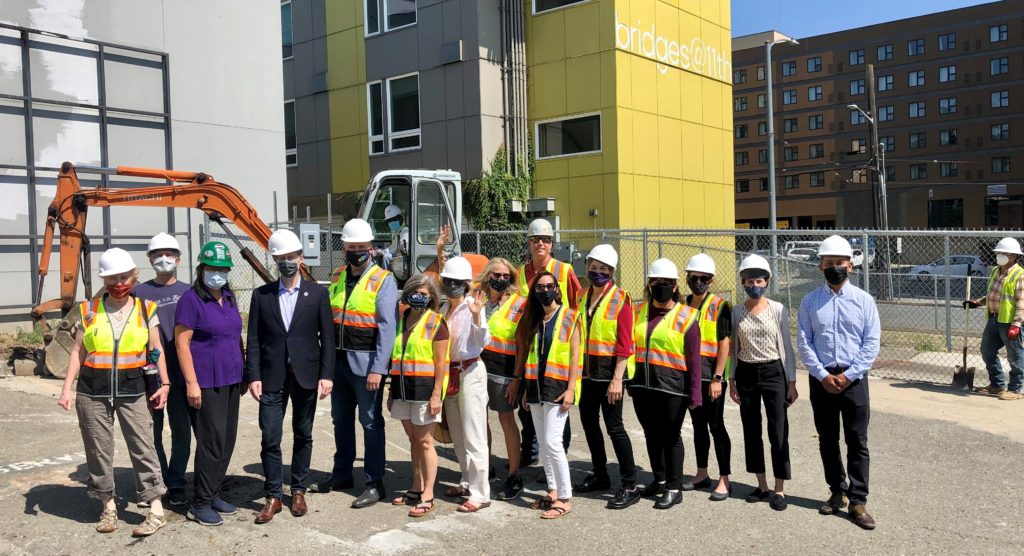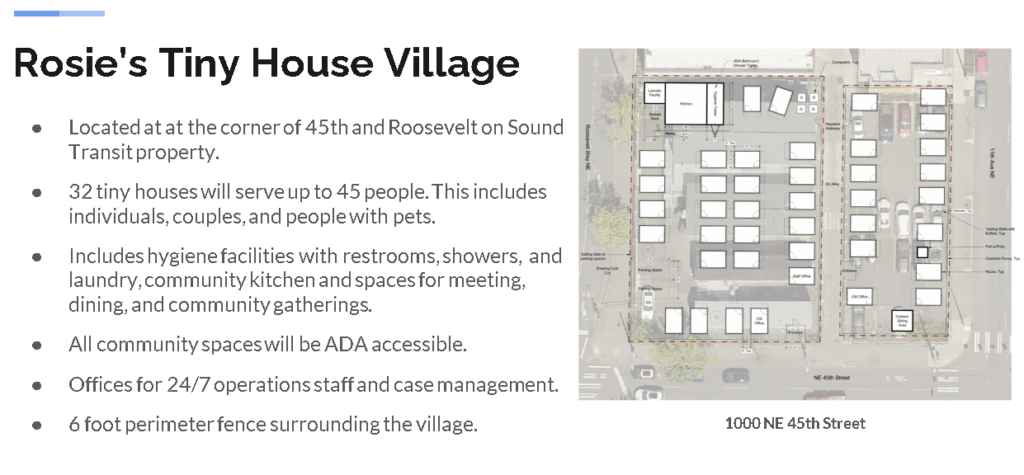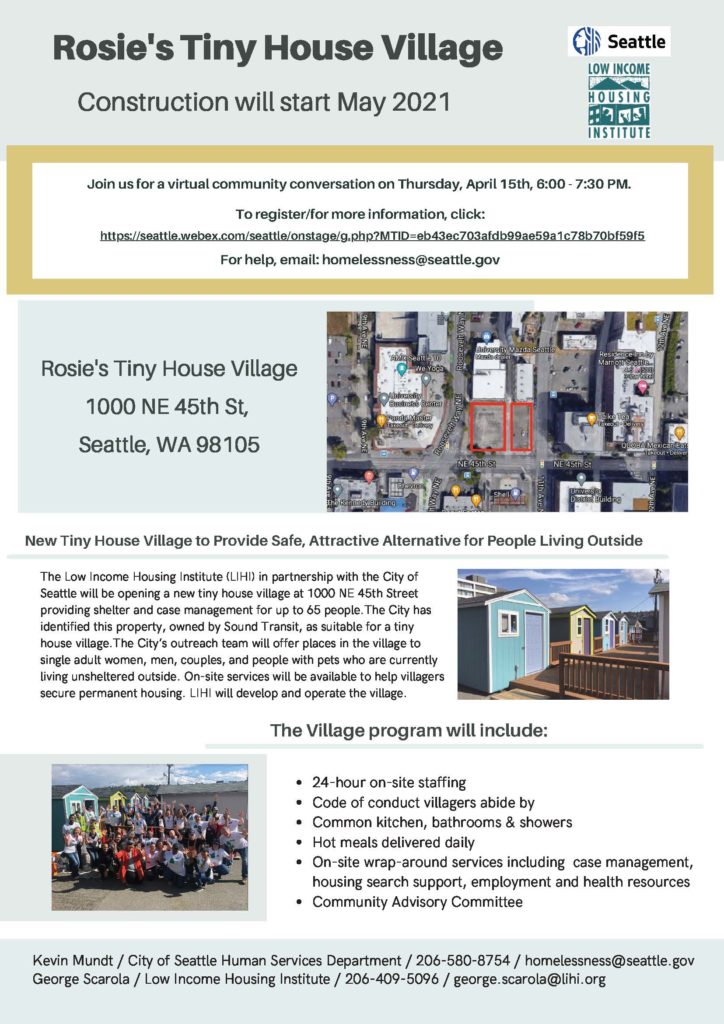Tiny Home Village Helping People Experiencing Homelessness in our District 4 Will Transform to More Permanent Low-Income Housing in Future
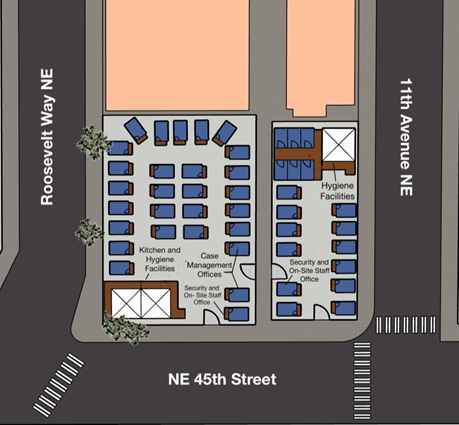
Here are updates on the new Tiny Home Village helping people experiencing homelessness in our District 4. Located in the heart of the U District at NE 45th Street and Roosevelt Way NE, Rosie’s Village has 35 temporary tiny homes in place for at least 2 1/2 years, thanks to the City of Seattle, Sound Transit, and the nonprofit Low Income Housing Institute (LIHI). The ultimate goal is to leverage the under-utilized, centrally located site near frequent transit to create up to 200, permanent low-income housing units in the future. These blog posts include updates from various sources including our City Council office’s e-newsletter.
“I share the concerns of my constituents that unsheltered homelessness in our streets, greenways, and parks increased during the COVID pandemic and we need action to help those in need and restore our public spaces for everyone,” said Alex Pedersen, Seattle Councilmember for District 4. “…Well-organized Tiny House Villages can be a cost-effective intervention when coupled with professional case management and performance-based contracts to ensure positive results. Rather than just talking about it, we did the legwork to find a suitable short-term location and funding for a Tiny House Village and I’m pleased we are able to stand it up quickly thanks to Sound Transit, our City’s Human Services Department, and caring neighbors and small businesses.”
Source: February 23, 2021 press release.
Want to help out at Rosie’s Village? In collaboration with many colleagues, Councilmember Pedersen obtained the site, the legislative authorization, and the ongoing funding for this Tiny Home Village in the heart of our University District. Anyone can help out the residents of Rosie’s by contacting the Low Income Housing Institute (LIHI). To volunteer, email volunteer.program@lihi.org or visit https://lihi.org/get-involved/ . To donate, email community.outreach@lihi.org . Thank you!
August 15, 2023: Advancing Plans to Maximize Permanent Low-Income Housing by Leveraging Centrally Located Land Near Frequent Transit
“I am eager to create additional permanent low-income housing in my district so that more people in need have a safe place to call home, including many who have been experiencing homelessness. By creatively optimizing our public infrastructure to reconfigure this public alley, we can enable the construction of many more units affordable to extremely low-income people at this centrally located intersection, where future residents can walk to jobs, education, health care, and, of course, public mass transit, including Sound Transit’s U District Station. After the space has served approximately 35 residents of a Tiny Home Village for several years, it should serve as a permanent home for dozens of additional low-income residents, including housing-ready individuals who have experienced homelessness (at 0% to 30% of the area median income). I’m grateful to have partners in Sound Transit and our City’s Office of Housing that understand it’s imperative to create as much housing as possible for extremely low-income people, so we can finally move beyond the homelessness crisis toward a more sustainable city for everyone.”
— Councilmember Alex Pedersen
- For the presentation by Sound Transit on August 15, 2023, CLICK HERE.
- For Clerk File 314496, which allows for the reconfiguration of the public alley to maximize future low-income housing, CLICK HERE.
Winter Holiday UPDATE (November and December 2021): Houses, Pies, Hats, Hope
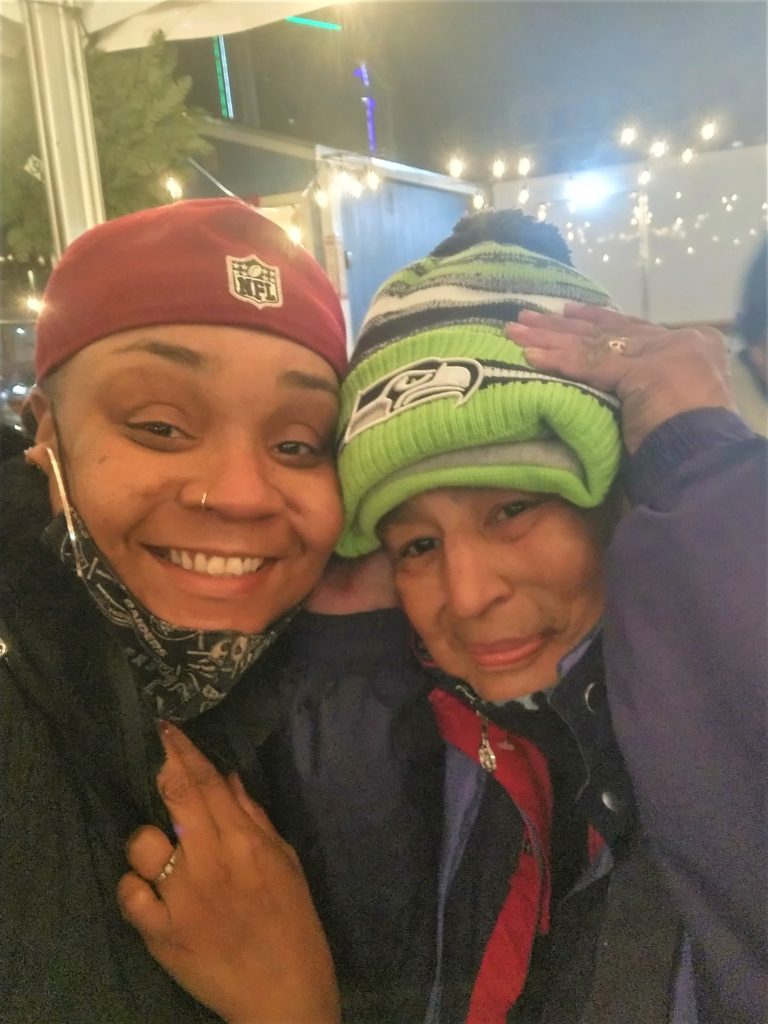
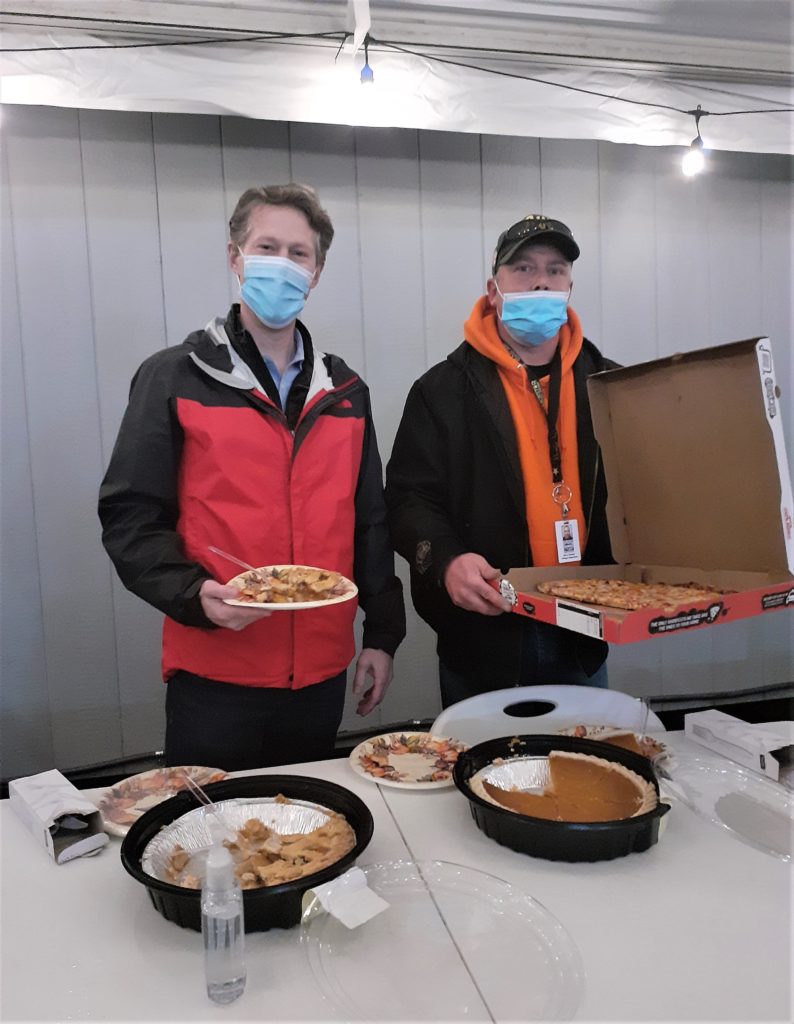
SEPTEMBER 28, 2021 UPDATE: Open House!
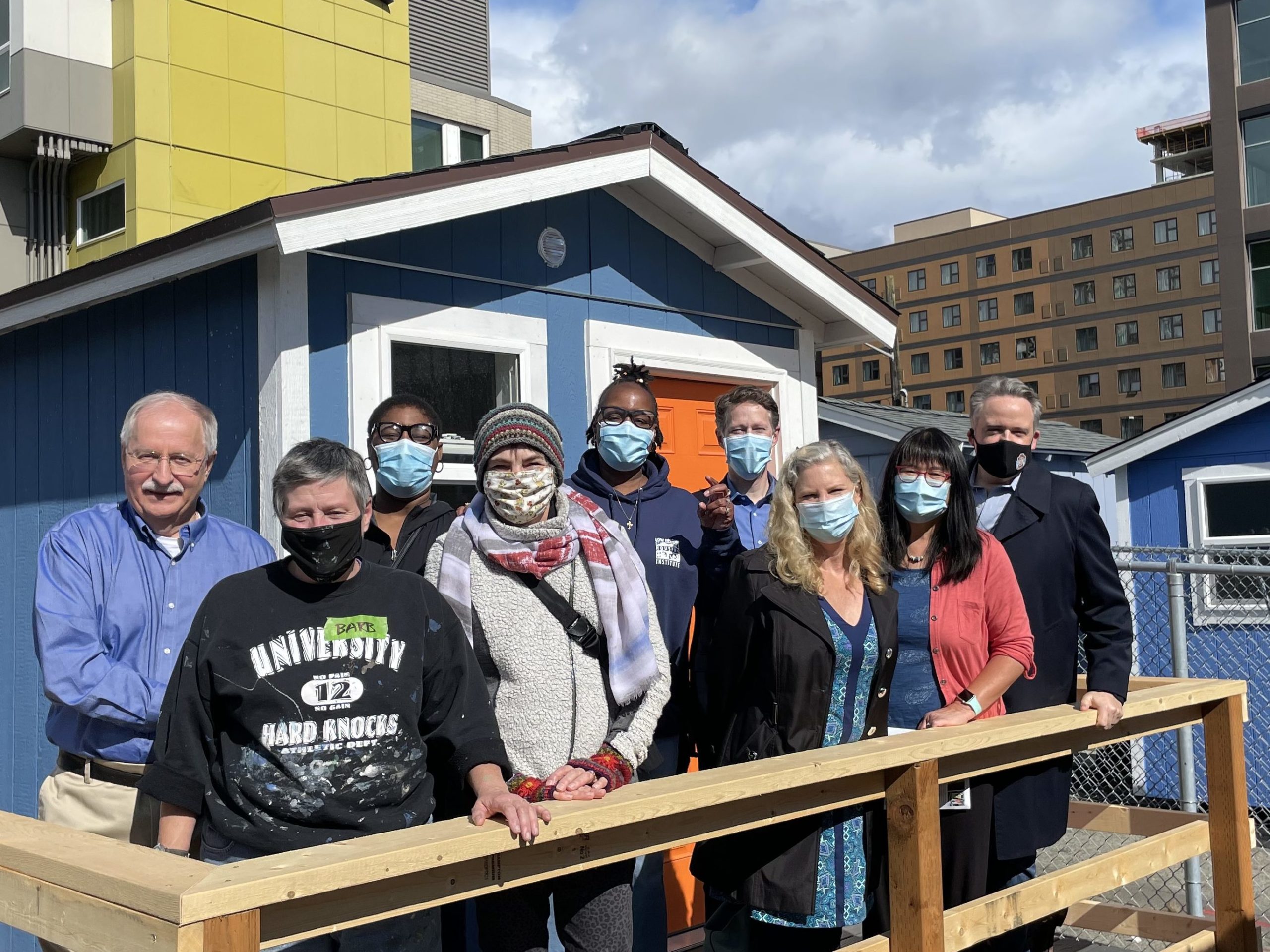
Here is our press release for the Open House:
Councilmember Pedersen, Sound Transit, Low Income Housing Institute, and District 4 Supporters Celebrate Tiny House Village Opening
Tiny House Village creates much needed shelter spaces in University District
SEATTLE, WA – Today Councilmember Alex Pedersen, the Low Income Housing Institute (LIHI), Sound Transit, Seattle’s Human Services Department (HSD), the University District business community, and neighbors celebrated the Open House for “Rosie’s” Tiny House Village, which will provide safe and supported living spaces for unsheltered neighbors.
The 36-unit village, which will open on unutilized property at NE 45th Street in the University District, is the first village on Sound Transit property. Named for the adjacent street, Roosevelt Way Northeast, Rosie’s Village case managers will help residents obtain permanent housing, employment, health care, food security, and other services. Each tiny house has electricity, overhead light, and a heater and the village has kitchen and restroom facilities, onsite showers and laundry, 24/7 security, and a counseling office.
During the City’s budget process last year, Councilmember Pedersen secured funding for capital and operating costs for a village. Councilmember Pedersen engaged with Sound Transit to ask if this publicly owned land could be used to site a tiny house village in order to increase Seattle’s shelter spaces to bring more unhoused neighbors inside.
Councilmember Pedersen’s office worked with Sound Transit and LIHI to prepare the site, including passing emergency legislation to allow the project to move forward with urgency during this crisis of homelessness amidst the COVID pandemic.
“This new tiny home village is an inspiring example of partnerships among governments, nonprofits, and community to address our most pressing crisis— homelessness. By working together and leveraging publicly-owned land, we’re creating a place, forging a path, and instilling hope for dozens of unsheltered people to come off the streets, stabilize their lives, and transition to permanent housing. I’m very grateful to both Sound Transit and the Low Income Housing Institute for enabling us to finally finish this life-saving project,” Pedersen said.
“Building permanent affordable housing is the key to ending homelessness, but tiny house villages help people living unsheltered now,” said Sharon Lee, Executive Director of LIHI. LIHI has developed 2500 units of permanent affordable housing and 13 tiny house villages in Puget Sound. “Almost everybody living outside would choose to move to a tiny house village tomorrow if they could. Tiny houses provide a door that locks, warmth, privacy, and safety from COVID-19. Villages offer wraparound services and the data shows they are the City’s most effective program helping people transition to permanent housing.”
Tiny houses offer tremendous benefits over tents—they are safe, weatherproof, and lockable—and the communities allow residents to reclaim their dignity and get on path to housing in a supportive village environment.
“Addressing the challenges for people experiencing homelessness is one of the most urgent issues facing our region,” said Kimberly Farley, Sound Transit’s Chief System Officer. “Sound Transit is pleased to partner with city leaders and the Low Income Housing Institute on this innovative project to help tackle the most critical need burdening our region.”
“Throughout the immense challenges of COVID-19, our dedicated HSD employees have been working tirelessly to ensure our neighbors experiencing homelessness can access safer places during the pandemic. This year alone, HSD anticipates the opening of over 700 new 24/7 enhanced and tiny house shelter spaces, which include brand new programs such as Rosie’s,” said Tess Colby, Interim Deputy Director of HSD. “These efforts are not done in a vacuum, and I would like to thank Mayor Durkan, Councilmember Pedersen, the Low Income Housing Institute, Sound Transit, Finance and Administrative Services, and all those who worked on this project in partnership to make it a reality.”
“While we can’t lose track of building permanent affordable housing, utilizing surplus lands to build temporary housing like Rosie’s Village is an important and tangible way we can also act with urgency to address the homelessness crisis we are facing here in Seattle today,” said Don Blakeney, Executive Director of the U District Partnership.
LIHI will form a Community Advisory Committee of neighborhood stakeholders to oversee progress of Rosie’s Village, provide feedback and advisory input to village staff, and to address questions, concerns, or offers of support from the community. These will be public meetings that all are welcome to attend, and often include nearby residential neighbors, local businesses, faith and community organizations, schools, and providers. If you wish to apply or are interested in learning more, please contact LIHI Community Engagement Director Josh Castle at josh.castle@lihi.org.
To find out about opportunities to donate items or volunteer, contact tinyhouses@lihi.org or Volunteer Programs Coordinator Alaa Hasan at alaa.hasan@lihi.org.
The lease between Sound Transit and the City of Seattle can be extended until May 2024. After the Tiny House Village, Sound Transit is likely to pursue the construction of a mixed use development that includes permanent affordable housing.
Photos from today’s press conference can be found on the Council’s Flickr page. A recording of the press conference will be made available by Seattle Channel on their website.
For the video of the press conference, CLICK HERE. Thank you, Seattle Channel!
Here are Councilmember Pedersen’s remarks from the Open House:
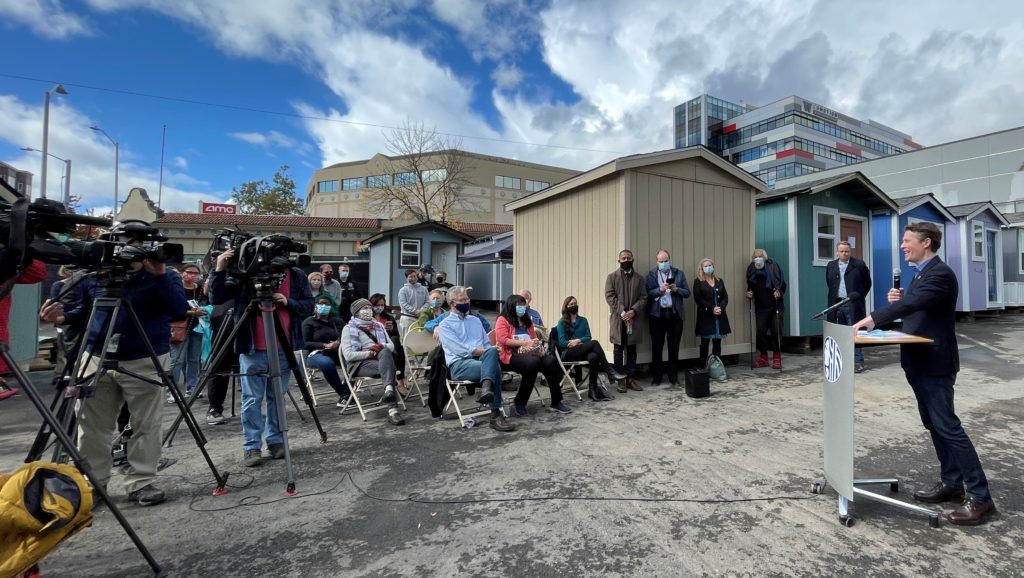
- Many of us here today don’t need to ask the tough question, Where will you lay your head to sleep tonight? But — for our neighbors sleeping under tents, cardboard, and bushes — this is a question of life and death EVERY night.
- We are here today to help answer that question for dozens of our neighbors experiencing homelessness.
- My name is Alex Pedersen, the City Councilmember for this district, and today we answer with MORE than a message of hope. Today we answer with solid structures — that people can count on — to shelter them from the rain and from the despair — in the face of homelessness.
- Today is NOT a day for hand-wringing or finger-pointing. Today is a day for results. More than 30 new houses. These houses may be tiny, but their impact is huge. Houses built strong, with wood and shingles — and love. Welcoming places for unsheltered neighbors to reset and renew.
- Welcome to Rosie’s Village!
- Thank you, Sound Transit, the Low Income Housing Institute, City Hall, and the many University District small businesses and neighbors who made it possible to open Rosie’s Tiny House Village.
- Named for the adjacent street, Roosevelt Way Northeast, Rosie’s Village will provide its residents with professional case management, 24/7 security, electricity, and hygiene and kitchen facilities. Rosie’s Village will empower its residents to obtain employment, health care, food security, and, ultimately, permanent housing — for a brighter life.
- Like all of us here today, I have seen the urgent need to do more to respond to the crisis of homelessness during the crisis of COVID. The University District, like many neighborhoods across Seattle, has seen a disturbing increase in visible homelessness.
- As soon as I noticed this site becoming available here in our district, I engaged with Sound Transit to ask them, would they be willing to lease this land to the City for a tiny house village. Let’s work together to bring more unhoused neighbors inside. Sound Transit said YES.
- So, last year, during the City’s budget process, I secured the funding for construction and operations.
- When the project ran into a barrier of bureaucratic hurdles, I helped everyone to jump over those hurdles and, with Councilmember Lewis, we expedited the legislation at City Hall to get it done.
- While one tiny home village will not solve the problem of homelessness, by opening Rosie’s Village today, we are — like Teddy Roosevelt’s niece Eleanor Roosevelt — lighting a candle rather, than cursing the darkness. Let’s us lift up this one small, but bright spot…to shine as a beacon for other efforts across the region…to get BIGGER results…so that, together, we bring EVERYONE inside for a brighter future.
- Thank you.
SEPTEMBER 23, 2021 UPDATE: Tiny Moves Moving Onto the Site!

See the Homes of our New Tiny Home Village!
To provide relief and hope for some people experiencing homelessness in our District, we are glad to see the recent activity at the future Tiny House Village. You may have noticed the first tiny houses have arrived onsite at Rosie’s Village in the U District. Set up has begun with the village scheduled to open mid-October. Next week we are planning a “Grand Opening” event. The site at 1000 NE 45th Street will have approximately 35 tiny houses. The land is being leased for free from Sound Transit by the City of Seattle with annual renewals through May 31, 2024. For more information, contact the nonprofit LIHI.
There are many people to thank for the success of this tiny home village in the University District and I want to make sure to highlight the hard work on this project by my Legislative Aide Cara Vallier.
AUGUST 18, 2021 UPDATE: Breaking Ground for Tiny Home Village in U District!
Here we are finally breaking ground August 18 to start installing the new Tiny Home Village called ”Rosie’s” at NE 45th Street and Roosevelt Way NE with the nonprofit Low Income Housing Institute (LIHI), Councilmember Pedersen with his Legislative Aide Cara Kadoshima Vallier, and Sound Transit — with support from the business improvement area (University District Partnership), community leaders, and volunteers. Thank you to the construction workers for getting started so the 36 tiny homes (coming soon) will have clean water and electricity!
Addressing the homelessness crisis with the urgency it deserves, I personally intervened to help resolve the outstanding issues so the City could finalize a first-of-its-kind lease with Sound Transit to use one of their sites in the University District for a new Tiny Home Village called “Rosie’s.” Councilmember Lewis and I then expedited the legislation through the City Council, with the Mayor agreeing to sign it immediately on August 9.
Addressing the homelessness crisis with the urgency it deserves, I personally intervened to help resolve the outstanding issues so the City could finalize a first-of-its-kind lease with Sound Transit to use one of their sites in the University District for a new Tiny Home Village called “Rosie’s.” Councilmember Lewis and I then expedited the legislation through the City Council, with the Mayor agreeing to sign it immediately on August 9.
The Council already authorized the funds for this tiny house village during our budget approvals last November. The nonprofit Low Income Housing Institute (known as “LIHI”) and their volunteers have completed building these tiny homes for the University District, which I was able to visit in their factory recently. So the last step was to get everyone to approve this first-of-its-kind lease, so we can get more people off the streets, into their own space — and onto a positive future.
The site is approximately 18,000 square feet and can fit approximately 36 tiny house structures. The lease would be for approximately 2 ½ years. After hosting the Tiny Home Village, the construction of new permanent affordable housing will occur on this site in our University District.
With the lease finalized, LIHI was able to hire their contractor for the trenching needed to provide fresh water, sewage removal, and electricity to the site – which can take 6 to 8 weeks to complete.
One of the reasons the lease was carefully crafted is because it will serve as a template for future partnerships, not only in Seattle, but also the region to accelerate our response to homelessness. I want to thank Sound Transit for making this land located near robust transit available to us to address homelessness in our area.
For the August 10 press release from Sound Transit, CLICK HERE.
For details and updates on this Tiny Home Village, CLICK HERE.
AUGUST 9, 2021 UPDATE:
Tiny Home Village Council Bill 120151 unanimously approves lease with Sound Transit!
Remarks during City Council meeting August 9, 2021:
- During our Committee on Homelessness Strategies and Investments two weeks ago, many of us expressed our eagerness to stand up Tiny Home Villages as part of our emergency response to homelessness. With professional case management, we know Tiny Home Villages are one of the non-congregate interventions that can help those experiencing homelessness get back on their feet and transition to permanent housing.
- I’m pleased to report we had a break-through two weeks ago in lease negotiations between the City and Sound Transit on what will be Sound Transit’s first Tiny Home Village location. I’d like to thank Sound Transit for their willingness to make this property available to us.
- Colleagues, in the spirit of engaging the homelessness crisis with the urgency it deserves, Councilmember Lewis and I walked onto last week’s Introduction & Referral Calendar Council Bill 120151, which is Item 1 on today’s full Council agenda. This expedited bill would authorize the City to enter into this lease with Sound Transit for use of the site for the tiny home village.
- I’d like to thank our Central Staff, especially Jeff Simms, for quickly finalizing this legislation so we did not have to wait any longer. Thank you, Councilmember Lewis, for enabling us to go straight to the Council rather than through your Committee.
- The Council already authorized the funds for this tiny house village during our budget approvals last November. The nonprofit Low Income Housing Institute (known as “LIHI”) and their volunteers have completed building these tiny homes for the University District, which I was able to visit in their factory recently. So the last step is approval of this lease, so we can get people off the streets and into their own space and onto a positive future.
- The site is approximately 18,000 square feet and can fit approximately 36 tiny house structures. The lease would be for approximately 2 ½ years. After hosting the Tiny Home Village, the construction of new permanent affordable housing will occur on this site in our University District.
- To further expedite this project, I have asked Sound Transit to sign the lease today, contingent upon our adoption. They have agreed. I have also asked the Mayor to sign the legislation within the next 24 hours and she has agreed. And, finally, our Financial and Administrative Services Director is standing by ready to sign the lease on behalf of the City government. And I know the nonprofit LIHI is eager to get started on the site, so let’s finally get this done and get more people experiencing homelessness inside.
- Ideally, this lease can be used as a template for future partnerships not only in Seattle but also the region to accelerate our response to homelessness. For a copy of the lease, CLICK HERE.
Additional thoughts:
Accountability: I acknowledge that this Tiny Home Village has taken too long to stand up. I believe the slow outcome was caused by a combination of factors, including: (1) as a legislator focused on finding the site and approving the funds, I did not recognize soon enough the need to jump in with a hands-on approach to break log-jams with the subsequent lease negotiations; (2) accommodating a tiny home village is not part of Sound Transit’s traditional transportation mission and they were consumed with their own budget challenges during the pandemic — so it was natural for them to be thorough when negotiating a unique land lease (and we certainly appreciate the actions they took to get it done); (3) our City Attorney’s Office seemed to treat this as a traditional property transaction requiring a “belt and suspenders” abundance of caution against potential liability, rather than creatively problem-solving with the urgency of the City-declared homelessness emergency. In the end, it required a proverbial “act of Congress” (an ordinance adopted by the City Council) to get it done. That is not sustainable and we all hope this hard-forged land lease can be used by others as a template to stand up other tiny home villages with professional case management so we can bring more people inside throughout the region.
Councilmember Lewis and I believe this experience (and his experience working on other tiny home villages) confirms the need to create a temporary position in our Legislative Department focused on tracking the progress of these homelessness interventions on a daily basis to identify specific hurdles and suggest solutions to overcome them (solving practical transactional problems rather than issuing policy critique memos), so we not only treat the homelessness emergency with the urgency it deserves but also deliver faster results. Let’s hope that simple solution doesn’t run into bureaucratic, myopic roadblocks, too!
APRIL 2021 UPDATE (Community Online Meeting April 15):
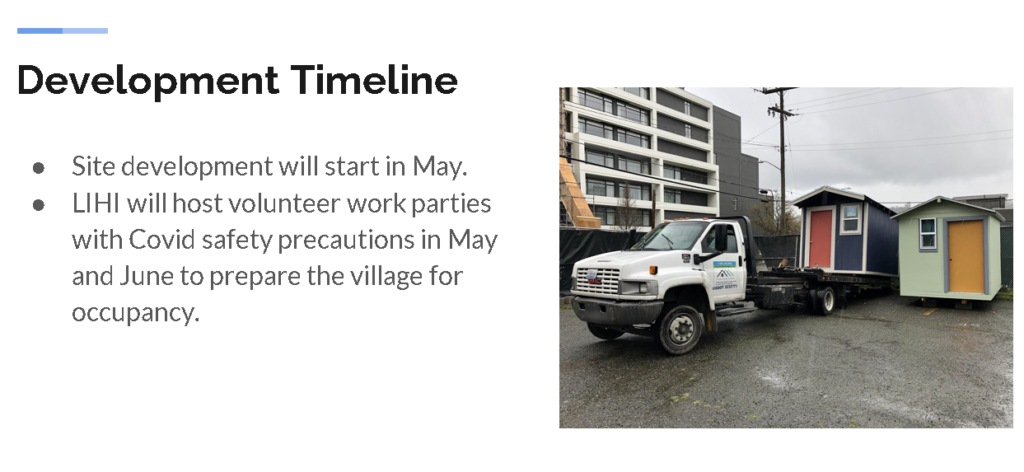
Thanks to everyone who participated in the community outreach meeting and for the many people who have emailed with questions as well as support. For the Powerpoint presentation from the community outreach meeting, CLICK HERE.
From: Homelessness <Homelessness@seattle.gov>
Date: April 7, 2021 at 5:28:08 PM PDT
To: Homelessness <Homelessness@seattle.gov>
Subject: University District Tiny Home Village
Dear Community,
The City of Seattle is excited to announce a new tiny home village in the University District expected to begin construction in May. This new shelter resource is part of more than 350 enhanced shelter and tiny home shelter spaces coming online this year.
The new village will be located at (1000 NE 45th St, Seattle, WA 98105) and operated by the Low Income Housing Institute (LIHI), providing 40 new units of shelter capacity. The program will provide 24/7 staffing, on-site case managers and security. The property is being leased from Sound Transit by the City.
The program will receive referrals from the City’s HOPE Team, based on recommendations from outreach service providers, to ensure appropriate service match.
The attached flyer includes more information on this program and contact information if you have questions. There is a virtual community meeting scheduled for April 15 from 6:00 PM to 7:30 PM with representatives from LIHI, City of Seattle’s Human Services Department, and Sound Transit. Click Here to register
Please feel free to share the meeting information and flyer with your tenants, colleagues, friends, and family.
Thank you for your understanding and partnership as we work together to address the difficult challenges facing our unhoused neighbors during the COVID-19 pandemic.
Sincerely,
Diana Salazar, Director, Homeless Strategy & Investment Division, City of Seattle, Human Services Department
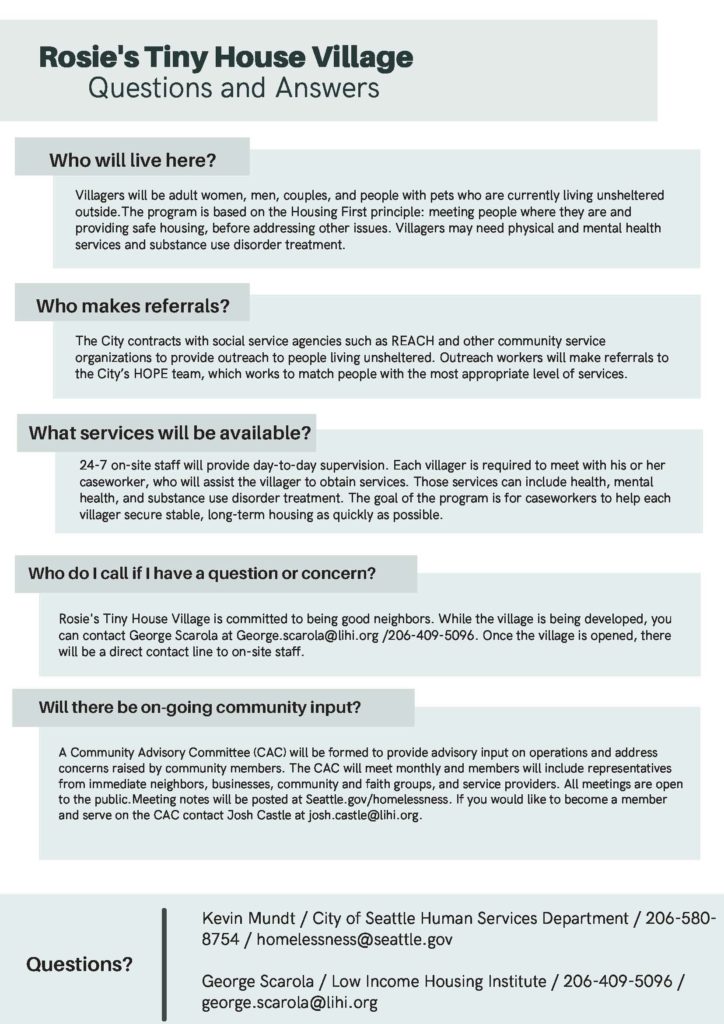
[Note: LIHI is calling this Tiny Home Village “Rosie” to reference nearby Roosevelt Way NE.]
FEBRUARY 2021 NEWSLETTER EXCERPT:

Tiny Home Villages: Chair of the Homelessness Strategies Committee (Councilmember Andrew Lewis) is proposing several new Tiny Home Villages in addition to the one I am shepherding in the University District. This will hopefully alleviate some of the suffering in the parks and near I-5.
DECEMBER 2020 NEWSLETTER EXCERPT:
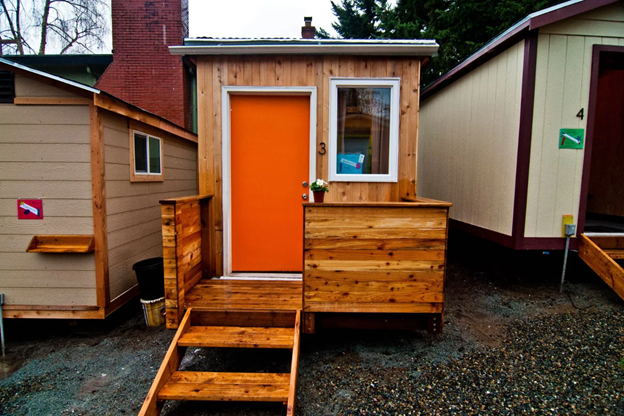
Addressing Homelessness
Set up Regional Homelessness Authority. A year ago, I cast a key vote to support the Regional Homelessness Authority between King County and the City of Seattle. It is clear the status quo has not worked, and a regional response to this regional crisis is needed. In taking this groundbreaking step, we are honoring the research and advice of experts to end the fragmented approach we currently have. It is my hope that we will now unify in a holistic and aligned manner to achieve better results. Although the selection of a CEO to stand up the organization has been delayed by COVID, we look forward to action in 2021. In addition to establishing the RHA last year, the City budget we recently approved finally sets aside the funds to fulfill the City’s financial commitment to this new regional effort. CLICK HERE for a link to the legislation, CLICK HERE to see King County’s statement on this issue, and CLICK HERE for the website of the new Regional Homelessness Authority.
Funded a Tiny Home Village in the University District. Given the COVID-19 pandemic and the ongoing homelessness crisis, I agree that well-organized tiny house villages can be a cost-effective intervention in conjunction with case management and a performance-based contract with our City’s Human Services Department. We have seen a sharp rise in encampments in D4, done the legwork of finding a suitable short-term location for a Tiny House Village, and wish to move expeditiously to address this urgent concern of finding shelter and housing compliant with CDC guidelines. This new Tiny Home Village at NE 45th Street and Roosevelt Way NE will provide shelter (30 to 40 tiny homes) and case management for those experiencing homelessness there. The village will be temporary (1 to 2 years) until the COVID pandemic is completely behind us and the site is developed, most likely with affordable housing.
FYI: For 90 of the coldest days, the University of Washington will once again host “Tent City 3,” which will have shelter for between 40 and 70 people experiencing homelessness. The location is the southern edge of campus behind the Wallace Building at NE Pacific Street & Brooklyn Ave in parking lot W35. For more info from UW, visit their “Addressing Homelessness” website by CLICKING HERE.
Improved accountability for homelessness response. At a time when homelessness appears to be growing, a majority of my Council colleagues unfortunately used the budget to dismantle our city’s interdepartmental Navigation Team that engaged with unauthorized homeless encampments. Instead, I believe we should have allocated more resources to our Human Services Department to track and evaluate the effectiveness of such changes. By a vote of 6 to 3, my colleagues accepted my proposal to require at least some tracking of results of their new model of outreach to homeless encampments. I firmly believe that we should always measure outcomes to make sure we are truly helping people.
NOVEMBER 2020 NEWSLETTER EXCERPT:
- Funding for a Tiny Home Village in the University District and more dollars to the Regional Homelessness Authority. Given the COVID-19 pandemic and the ongoing homelessness crisis, I agree that well-organized tiny house villages can be a cost-effective intervention in conjunction with case management and a performance-based contract with the Human Services Department (HSD). We have seen a sharp rise in encampments in D4, done the legwork of finding a suitable short-term location for a Tiny House Village, and wish to move expeditiously to address this urgent concern of finding shelter and housing compliant with CDC guidelines. In addition, this budget finally transfers substantial sums away from city government operations to the new Regional Homelessness Authority. Regional problems require regional solutions and, considering the City of Seattle’s spotty track record in responding to homelessness, the forthcoming regional operation is a welcome change.
- Clean Cities Initiative. CLICK HERE to read an overview of this proposal to surge the clean-up of litter and illegal dumping. Since the beginning of the pandemic, through a combination of increases in trash at parks, reduced staffing due to COVID-19 safety, and a lack of volunteer opportunities for residents, the City faced significant challenges addressing litter and illegal dumping remediation. Data from Seattle Public Utilities’ (SPU) Illegal Dumping program shows a 195% increase in the volume of material collected from Q2 to Q3 2020. Departments, including SDOT, Parks & Recreation, Office of Economic Development, and SPU, will create a comprehensive plan to address the increase of waste challenges across the City which would stand up a rapid response team within Seattle Parks and Recreation to address trash in parks, and make infrastructure improvements in key parks to improve overall cleanliness. The proposal increases the purple bag program, the number of needle disposal boxes in the city and would expand the graffiti ranger program. Funding would also be directed to business districts throughout the city to increase contracted cleaning in their neighborhoods such as the University District. In addition, SPU would more than double the number of trash pickup routes which provide twice weekly collection of trash and bulky items in public rights of way which should greatly benefit District 4.
OCTOBER 2020 NEWSLETTER EXCERPT:
HOMELESSNESS INTERVENTION IN DISTRICT 4: WHAT DO YOU THINK?

Many constituents have contacted me with concerns that the number of unauthorized encampments around District 4 has grown and, as I travel through the district each day, I see the suffering with my own eyes. The public health social distancing requirements of the COVID pandemic have required homeless shelters to “de-intensify,” thereby reducing their capacity by approximately half. Fortunately, the Durkan Administration has created additional shelter opportunities and has a plan for surging temporary housing as part of their 2021 budget. Unfortunately, a majority of my colleagues on the City Council still plan to defund and dismantle the team of city government employees that had been responding to homelessness (the Navigation Team).
To help to respond to what appears to be an increase of people experiencing unsheltered homelessness, I have worked with a local nonprofit and submitted an amendment to the budget to set aside funds necessary for a temporary new Tiny Home Village in our University District, which would have good access to transit. Used by Sound Transit for field offices during the construction of the Brooklyn Avenue light rail station (which opens next year), this small, centrally located site is scheduled for permanent affordable housing in a year or two. Given the ongoing COVID-19 pandemic and homelessness crisis, I’m hopeful that a well-organized “village” of 30-40 “tiny homes” can be a cost-effective intervention as long as it is operated by a nonprofit experienced in exiting people to permanent housing in conjunction with case management and a performance-based contract with our Human Services Department. Our district has been home to various iterations of temporary and approved encampments and has generally been welcoming if the location makes sense and there is a plan.
We have seen a sharp rise in homelessness in our district and I’m hopeful this will help to address it until shelters throughout our region can restore their capacity, until the new Regional Homelessness Authority is fully addressing this regional problem– all while our Seattle Office of Housing continues to fund the construction of permanent affordable housing as fast as it can. Results instead of rhetoric. If you have comments or concerns about this partial solution, please contact my office at Alex.Pedersen@seattle.gov
FEBRUARY 2020 NEWSLETTER EXCERPT:
Transitional Encampments (Council Bill 119656):
On February 18, 2020, the City Council voted 6-1 to approve Councilmember Kshama Sawant’s bill to expand the number of city-sanctioned “transitional encampments” – which includes tents, cars and RVs – from three to 40. While Councilmembers Sawant, Herbold, Juarez, Lewis, Morales, and Strauss voted in favor of this encampment bill, I opposed it for several reasons. In my opinion, this bill was falsely advertised as “tiny home villages” when, in fact, it dramatically expands an ineffective tent encampment model that fails to sufficiently reduce homelessness. My amendments to modestly expand the actual Tiny Home Village model did not pass.
As someone who served the Clinton Administration at the U.S. Department of Housing and Urban Development, I know that homelessness is a regional crisis that requires regional solutions. I’m proud that one of my first votes on the Council was to join Mayor Durkan, the previous City Council, and King County officials to create the Regional Homelessness Authority. Aggressively expanding tent encampments—just within our city limits — seems to ignore the strategy our region is crafting to address this regional crisis. For more on my decision to vote ‘no,’ please visit my blog.
FEBRUARY 18, 2020 POST:
Kshama Sawant’s bill to create 40 tent encampments in Seattle passed, but without sensible amendments
Today the City Council approved Councilmember Kshama Sawant’s bill to expand the number of tent encampments authorized by our city government from three to 40. The final vote was 6 to 1 and I was the lone No vote (which I explain below).
Hoping to make her encampment legislation stronger, I offered amendments to preserve, expand, and extend the successful version of the “Tiny Home Village” model that lifts up those experiencing homelessness by effectively transitioning them to permanent housing. Unfortunately, my amendments to honor our new regional approach and focus on what works by modestly expanding the actual Tiny Home Village model did not pass. In my opinion, this bill was falsely advertised as “tiny home villages” when, in fact, it dramatically expands an ineffective tent encampment model that fails to sufficiently reduce homelessness.
When I served the Clinton Administration at the U.S. Department of Housing and Urban Development (HUD), I was literally working in the office that reviews funding requests from cities across the country seeking to reduce homelessness. My career outside the federal government included years financing the preservation and construction of affordable housing for low income individuals and families across the nation. With that experience, I know it’s vital that we invest in programs that truly work.
After a shaky start in some locations, several Tiny Home Villages became a success story — but only when built and managed effectively to achieve the positive result of actually exiting residents to permanent housing.
I’m grateful to those Council colleagues who voted with me today to require case management, which is one of the essential elements to help those experiencing homelessness get the permanent housing and services they need to thrive. One of my other amendments would have required the actual physical structures of what we know of as “Tiny Homes” — a roof, four walls, and a door. Without requiring the physical structures, the bill that passed today is really just a massive expansion of tent encampments.
Homelessness is a regional crisis that requires regional solutions. I’m proud that one of my first votes was to join Mayor Durkan, the previous City Council, and King County officials to create the Regional Homelessness Authority (RHA). This regional body will have experts from the region including those with lived experience of homelessness who will create a Five Year Plan with proven solutions to reduce homelessness. One of my amendments was to sunset the encampment law in 2023, at which time we would “consider future extensions based on policy guidance to be established by the King County Regional Homelessness Authority.” Without my amendment, the sponsor’s proposal to expand tent encampments from three to 40 — within just our city limits — seems to ignore the strategy our region is crafting to address our regional crisis. Unfortunately, my amendment to sunset this new policy did NOT pass.
Homelessness was, by far, the top concern I heard from residents in every neighborhood of my district over the past year and my district has repeatedly welcomed both tiny home villages and temporary tent encampments on the property of faith-based organizations. When investing tax dollars or changing land use policies, I believe our compassion for those experiencing homelessness requires that we get results with solutions proven to work.
I believe my amendments would have been a good compromise to preserve, extend, and modestly expand a successful model but, because those amendments did not pass, I felt it was important to vote No on this poorly structured bill from Councilmember Sawant. Regardless, the bill passed, so I look forward to monitoring the program to be administered by the Seattle Human Services Department (HSD) and Seattle Department of Construction and Inspections (SDCI). After we collect data on results and after the RHA issues its regional Five Year Plan crafted by experts (including those experiencing homelessness), I look forward to making appropriate adjustments to achieve the goal we all seek: dramatically reduce homelessness so that it is rare, one-time, and brief.
# # #
Posted: August 15th, 2023 under Councilmember Pedersen


